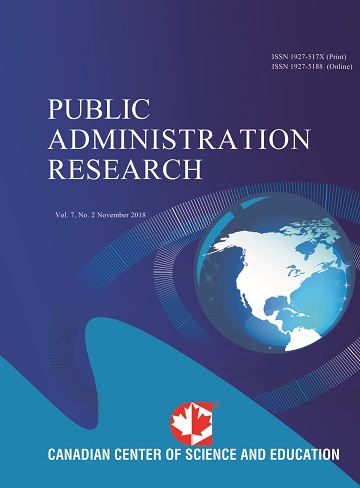Public Service and Poverty Eradication in Nigeria: An Assessment of National Poverty Eradication Programme (NAPEP), 2001-2011
- Lawal Oladimeji
- Hassan Said
Abstract
The public service is the central machinery with which the state discharges its responsibility of governance. The success or otherwise of government depends to a large extent on the effectiveness of its public service. This paper assesses the impact of the public service on poverty eradication in Nigeria with a focus on National Poverty Eradication Programme (NAPEP) of the federal Government. The paper used content analysis for its data generated via the secondary sources; while relying on public choice theory as its theoretical framework. The findings revealed that, NAPEP has been able to assist only a fraction of poor Nigerians in various ways such as provision of loan; provision of cash assistance, Keke NAPEP and a few other programmes. However, the achievements of the organisation are quite insignificant when compared with the magnitude of poverty in Nigeria. This explains why the incidences of poverty has remained high (about 64.4%) among Nigerians. The paper contends that rent seeking behaviour of public servants is the major hinderance to effective service delivery in the Nigerian public service. A number of problem currently bedevilling the organisation and its activities include inadequate funding, operational problems, lack of independence in decision making among others. It is recommended that, the federal Government reviews the operational framework of the agency; and improves its funding in order to grant it more operational autonomy in the pursuit of its mandates.
- Full Text:
 PDF
PDF
- DOI:10.5539/par.v1n1p94
Journal Metrics
h-index (2017): 7
i10-index (2017): 6
h5-index (2017): 7
h5-median (2017): 13
Index
- COPAC
- CrossRef
- DTU Library
- EBSCOhost
- EuroPub Database
- Excellence in Research for Australia (ERA)
- Genamics JournalSeek
- Ghent University Library
- Google Scholar
- Harvard Library
- Infotrieve
- Jisc Library Hub Discover
- LOCKSS
- Mir@bel
- Norwegian Centre for Research Data (NSD)
- Open J-Gate
- PKP Open Archives Harvester
- Publons
- ROAD
- Scilit
- SHERPA/RoMEO
- Stanford Libraries
- Ulrich's
- UniCat
- Universe Digital Library
- UoS Library
- WorldCat
Contact
- Gabriel TaiEditorial Assistant
- par@ccsenet.org
